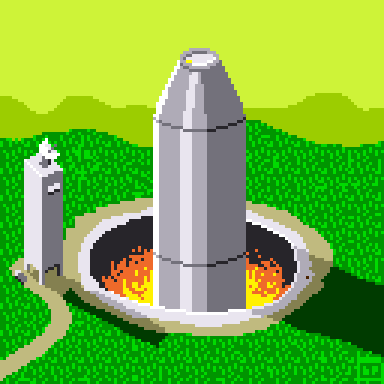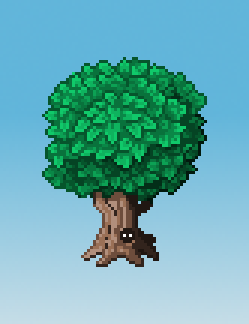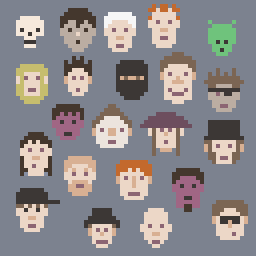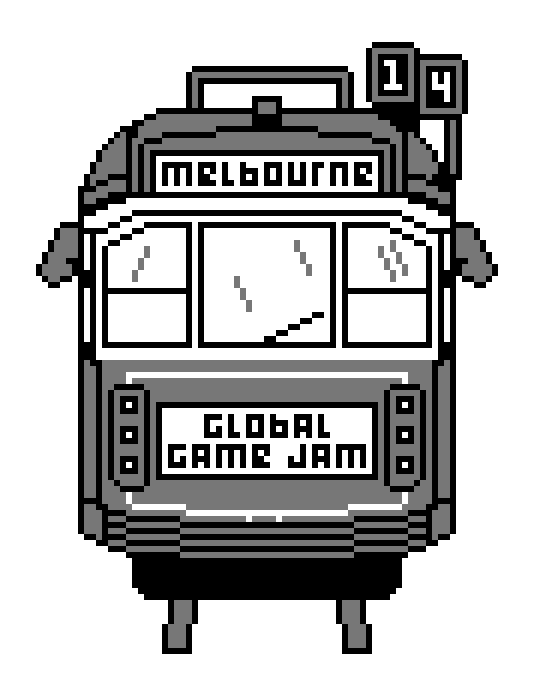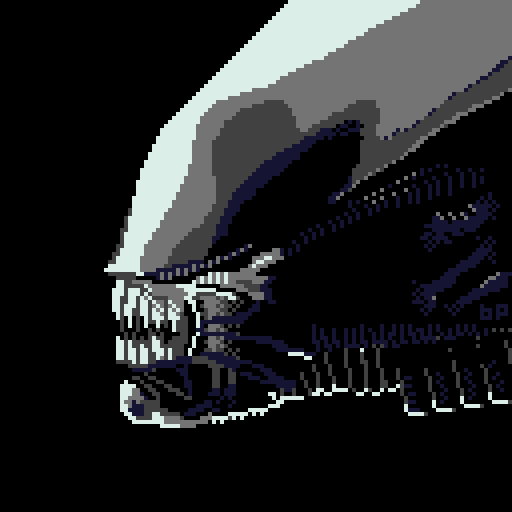Whoops, the code below has been mangled by wordpress, sorry! I’ll keep it in the post but here’s a link to the source also.
Hey there! Here’s the source for a simple tile-based game in SFML. You move the white player around a small world that contains randomly moving red and green zombies. The code demonstrates basic gamedev and SFML concepts such as collision detection, game state, movement interpolation, and uses a simple data-oriented design.
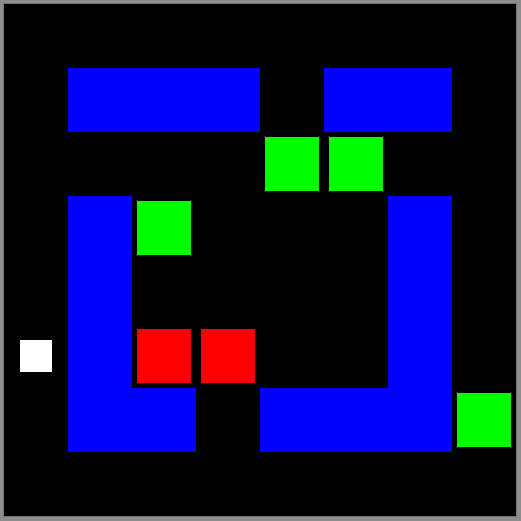
[cpp]
#include
#include
#include
#include
#include
#include
#include
using namespace std;
static const int WINDOW_WIDTH = 512, WINDOW_HEIGHT = 512;
static const int TILES_WIDE = 8, TILES_HIGH = 8;
static const int TILE_WIDTH = WINDOW_WIDTH/TILES_WIDE, TILE_HEIGHT = WINDOW_HEIGHT/TILES_HIGH;
enum Tile {
TILE_WATER,
TILE_DIRT,
TILE_INVALID,
};
class Map {
public:
Map(){}
Map(string mapString){
// Convert map string into tiles
if (mapString.length()!=TILES_WIDE*TILES_HIGH){
cerr << "map string is wrong length!";
return;
}
for(int i=0;i
};
// Checks to see if theres a monster here
bool isMonsterHere(Game& game, int i, int j){
for(auto monster: game.monsters){
if (monster.i==i && monster.j==j) return true;
}
return false;
}
// Checks to see if theres a player here
bool isPlayerHere(Game& game, int i, int j){
if (game.player.i==i && game.player.j==j) return true;
else return false;
}
// Linear interpolation
float lerp(float a, float b, float t){
return a*(1-t) + b*t;
}
int main(){
srand(time(NULL)); // seed randomiser
sf::RenderWindow window(sf::VideoMode(WINDOW_WIDTH, WINDOW_HEIGHT), “Game”);
// Setup game
Game game;
game.state = WAITING_FOR_PLAYER_INPUT;
// Setup map
string mapString =
” ”
” ~~~ ~~ ”
” ”
” ~ ~ ”
” ~ ~ ”
” ~ ~ ”
” ~~ ~~~ ”
” “;
game.map = Map(mapString);
// Setup player
game.player.i = 0;
game.player.j = 0;
game.player.isMoving = false;
game.player.oldI = 0;
game.player.oldJ = 0;
game.player.pi = 0.0f;
game.player.pj = 0.0f;
// Create some monsters
const int NUM_MONSTERS = 6;
for(int i=0;i
type = RED_ZOMBIE;
}
// Find an empty dirt spot to place the monster
int placeI = 0, placeJ = 0;
while(true){
int ri = rand()%TILES_WIDE;
int rj = rand()%TILES_HIGH;
// Check for collision with player or other zombies
bool canPlaceHere = true;
canPlaceHere = !isPlayerHere(game, ri, rj);
canPlaceHere = canPlaceHere && !isMonsterHere(game, ri, rj);
canPlaceHere = canPlaceHere && game.map.tile(ri, rj)==TILE_DIRT;
if (canPlaceHere){
placeI = ri;
placeJ = rj;
break;
}
// else keep trying
}
Monster monster;
monster.type = type;
monster.i = placeI;
monster.j = placeJ;
monster.isMoving = false;
monster.oldI = monster.i;
monster.oldJ = monster.j;
monster.pi = (float) placeI;
monster.pj = (float) placeJ;
game.monsters.push_back(monster);
}
// Start loop
game.clock.restart();
while (window.isOpen())
{
// Manage Input
sf::Event event;
while (window.pollEvent(event))
{
if (event.type == sf::Event::Closed){
window.close();
}
if (game.state==WAITING_FOR_PLAYER_INPUT){
if (event.type==sf::Event::KeyPressed){
int di = 0, dj = 0; // the direction to move in
switch (event.key.code){
case sf::Keyboard::Left: di = -1; break;
case sf::Keyboard::Right: di = 1; break;
case sf::Keyboard::Up: dj = -1; break;
case sf::Keyboard::Down: dj = 1; break;
default: break;
}
if (di!=0 || dj!=0){
// Player wants to move so try to move him
int i = game.player.i + di;
int j = game.player.j + dj;
// Check targe tile for collision
bool collision = false;
Tile t = game.map.tile(i,j);
switch (t){
case TILE_WATER: case TILE_INVALID: collision = true; break;
default: break;
}
collision = collision || isMonsterHere(game, i, j);
if (!collision){
// Can move there
game.player.oldI = game.player.i;
game.player.oldJ = game.player.j;
game.player.i = i;
game.player.j = j;
game.player.isMoving = true;
game.state = UPDATING_PLAYER;
game.clock.restart();
}
}
}
}
}
// Update other game state etc
switch (game.state){
case WAITING_FOR_PLAYER_INPUT:
{
// Player gets only a short time to make a move
// The logic of movement is handled in the event handled
static const float MAX_TIME_TO_MOVE = 2.0f;
float t = game.clock.getElapsedTime().asSeconds();
if (t >= MAX_TIME_TO_MOVE){
game.state = UPDATING_PLAYER;
game.clock.restart();
}
break;
}
case UPDATING_PLAYER:
{
static const float MOVE_SPEED = 0.2f; // seconds it takes to move
float t = game.clock.getElapsedTime().asSeconds();
t = min(MOVE_SPEED, t);
if (game.player.isMoving){
game.player.pi = lerp(game.player.oldI, game.player.i, t/MOVE_SPEED);
game.player.pj = lerp(game.player.oldJ, game.player.j, t/MOVE_SPEED);
}
if (t >= MOVE_SPEED){
game.player.pi = game.player.i;
game.player.pj = game.player.j;
game.player.oldI = game.player.i;
game.player.oldJ = game.player.j;
game.player.isMoving = false;
game.state = UPDATING_MONSTERS;
game.clock.restart();
// We now update all monsters
for(auto& monster: game.monsters){
// Monsters move randomly
// and sometimes stay still
double random = (1.0*rand())/RAND_MAX;
if (random > 0.6){
// stay still
continue;
}
// Here’s a list of possible directions (di,dj)
static const int DIRS[4][2] = {{1,0},{-1,0},{0,1},{0,-1}};
// randomly index into the list
int randomDirIndex = rand()%4;
// And then try each direction in turn
for(int dir=0;dir<4;dir++){
int index = (dir + randomDirIndex)%4;
int di = DIRS[index][0];
int dj = DIRS[index][1];
int i = monster.i + di;
int j = monster.j + dj;
// Check targe tile for collision
bool collision = false;
Tile t = game.map.tile(i,j);
switch (t){
case TILE_WATER: case TILE_INVALID: collision = true; break;
default: break;
}
collision = collision || isPlayerHere(game, i, j) || isMonsterHere(game, i, j);
if (!collision){
// Can move there
monster.oldI = monster.i;
monster.oldJ = monster.j;
monster.i = i;
monster.j = j;
monster.isMoving = true;
break;
}
}
}
}
break;
}
case UPDATING_MONSTERS:
{
static const float MOVE_SPEED = 0.4f; // seconds it takes a zombie to move
float t = game.clock.getElapsedTime().asSeconds();
t = min(MOVE_SPEED, t);
for(auto& monster: game.monsters){
if (monster.isMoving){
monster.pi = lerp(monster.oldI, monster.i, t/MOVE_SPEED);
monster.pj = lerp(monster.oldJ, monster.j, t/MOVE_SPEED);
}
}
if (t >= MOVE_SPEED){
for(auto& monster: game.monsters){
monster.oldI = monster.i;
monster.oldJ = monster.j;
monster.isMoving = false;
}
game.state = WAITING_FOR_PLAYER_INPUT;
game.clock.restart();
}
break;
}
}
// Draw
window.clear(sf::Color::Black);
// Draw map
for(int i=0;i
